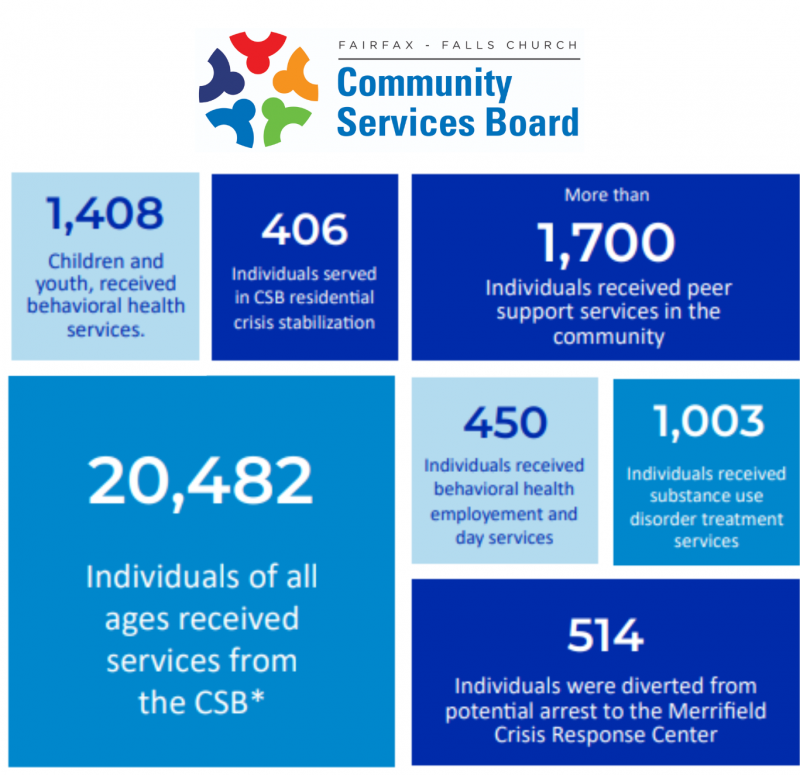
It's always time to fight stigma, provide support, increase awareness and remind you of the services that exist to support you and loved ones impacted by mental health issues.
According to the National Alliance on Mental Illness, nearly one in five people experience a mental health concern each year. If you or someone you know is struggling with a mental health issue, you are not alone and resources are available.
Community Services Board
The Fairfax-Falls Church Community Services Board (CSB) provides services for people of all ages who experience mental health issues, substance use disorders and/or developmental disabilities. The FY 2022 CSB Annual Report highlights services provided to the community as well as challenges and progress towards the delivery of mental health services.
- 20,482 individuals of all ages received services from the CSB.
- 6,527 individuals received CSB Emergency Services.
- 4,040 individuals received same day walk-in screening and assessments.
- 88% received emergency services within one hour.
- 5,227 individuals with developmental disabilities received support coordination services.
- More than 1,700 individuals received peer support services in the community.
- 1,408 children and youth received behavioral health services.

Help is Available
In a mental health or substance use emergency, help is just a phone call away. Call 703-573-5679, TTY 711.
For non-emergency CSB services, call our Entry & Referral Services during normal business hours, Monday through Thursday, 9 a.m. to 3 p.m., and Friday 10:30 a.m. to 3 p.m., at 703-383-8500, TTY 711. Staff can take calls in English and Spanish and can access interpreters for other languages when needed.
Learn more about accessing quality care for children and youth on the Healthy Minds Fairfax website.
Resources
CSB also offers in-person and online training courses and tools to all residents of Fairfax County and the cities of Falls Church and Fairfax:
- Mental Health First Aid is a public education program that teaches you about mental health and substance use concerns and provides skills training for you to feel confident helping someone obtain the support and care they deserve.
- Question, Persuade and Refer (QPR) is a suicide prevention training that teaches three simple yet powerful steps anyone can learn to help save a life from suicide. The signs of a crisis are all around us. The training teaches you to recognize the warning signs of suicide, ask tough questions and offer hope, and get help to save a life.
- REVIVE! trainings prepare you to react safely and effectively in an overdose situation, to administer the lifesaving drug naloxone and to know what to do afterward. Each attendee also receives a free REVIVE! kit, which includes naloxone and two fentanyl test strips.
- The Adverse Childhood Experiences (ACE) Interface Presentation helps individuals understand the impacts of childhood adversity and trauma on development and how to build resiliency and improve well-being.
- Talk. They Hear You empowers parents and caregivers to talk with children and teens about alcohol use. Understand the risks and triggers of underage drinking and how to play a role in prevention.
- An essential strategy for preventing suicide for a person in crisis is to limit access to firearms and poisons, including medications which can be misused. Lock and Talk is a call for all persons to encourage help-seeking behaviors, practice safe storage and disposal of lethal items (medications, firearms, etc.) and help to reduce stigma around mental illness. You can obtain a free medication lock box, drug disposal pouch and firearm lock from the CSB.
Remember that promoting positive mental health and creating good habits to support our mental health takes practice and awareness. Together we can help shine a light on mental health and eliminate stigma surrounding mental health issues.



 SIGN UP FOR DAILY EMAIL HEADLINES
SIGN UP FOR DAILY EMAIL HEADLINES